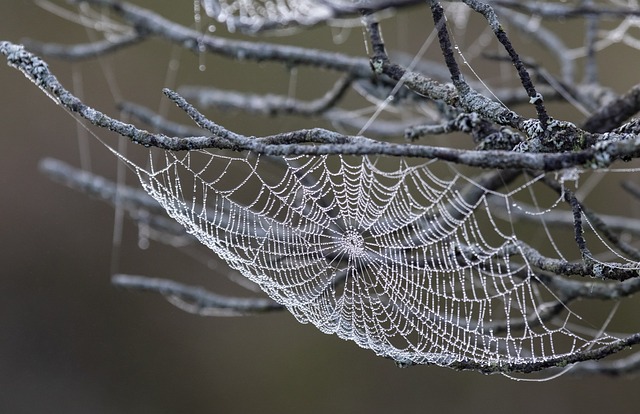To effectively prevent and manage spider infestations, it's crucial to adopt proactive measures and understand the behaviors of these arachnids. For residential spider prevention, focus on sealing entry points, maintaining cleanliness, and using eco-friendly repellents or natural products like vinegar or peppermint oil. Regular property inspections and decluttering can also deter spiders. In commercial settings, professional spider control services offer tailored assessment and treatment plans that consider the unique ecological needs of each environment. These experts utilize advanced strategies for long-term spider management, ensuring both safety and efficacy. Additionally, they provide maintenance plans for ongoing monitoring and management to prevent future infestations. Whether at home or in business spaces, professional guidance is key to implementing effective spider-proofing solutions that align with sustainable practices, thereby safeguarding your property against unwanted eight-legged guests.
When autumn leaves begin to fall and winter’s chill sets in, spiders seek shelter from the cold. Understanding this behavior is key to preventing spider infestations. This article delves into effective residential spider prevention strategies, emphasizing spider-proofing your home environment. It also explores the role of professional spider control services in managing outdoor populations and introduces eco-friendly solutions for a spider-free living space. With the right knowledge and approach, you can protect your home from these eight-legged creatures without resorting to harsh chemicals.
Understanding Spider Behavior to Effectively Prevent Infestations
Residential Spider Prevention: Tips for a Spider-Free Home Environment
To effectively prevent spider infestations in residential settings, it’s crucial to understand their habits and environments they favor. Regular cleaning and decluttering can significantly reduce the presence of spiders by removing their food sources—insects and other pests—and eliminating potential hiding spots. Ensure that windows and doors have fine mesh screens to prevent spiders from entering through gaps. Additionally, sealing cracks and crevices around the home’s exterior can help block entry points. Landscaping should be managed to minimize leaf litter and cluttered garden areas adjacent to the home. Eco-friendly spider prevention solutions, such as natural repellents like vinegar or peppermint oil, can deter spiders from making your home their own. For a more robust solution, professional spider control services can be engaged to assess and treat your property effectively.
For comprehensive protection against spiders, residential spider prevention goes beyond DIY measures. Homeowners should consider regular inspections and maintenance of the dwelling’s structure to ensure no entry points are overlooked. Employing pest control for spiders that utilize integrated pest management techniques can offer a balanced approach, targeting both spiders and their food sources. This method not only addresses the immediate issue but also helps prevent future infestations. In contrast, commercial spider control services may employ more aggressive strategies tailored to larger properties or high-traffic areas where an infestation could pose a significant risk to public health or safety. It’s important to engage with licensed professionals who can provide the most effective and safe solutions for your specific situation.
The Role of Professional Spider Control Services in Managing Outdoor Populations
When confronted with a spider infestation, professional spider control services stand as a cornerstone in managing outdoor populations effectively. These experts employ advanced strategies and tools tailored to the specific ecology of an area, ensuring that treatment methods are both targeted and comprehensive. By conducting thorough inspections, they can pinpoint harborages where spiders thrive, deploying eco-friendly spider prevention solutions that minimize environmental impact while maximizing efficacy. Residential and commercial clients alike benefit from these services by safeguarding their premises against harmful spiders, thereby reducing the risk of potential bites or ecological disruption.
In addition to one-time treatments, professional spider control offers ongoing maintenance plans that monitor and manage any recurring spider activity. These plans are instrumental in preventing a spider infestation by creating a barrier that deters spiders from entering properties. Spider prevention tips provided by these services often include habitat modification and exclusion methods, which are key components of residential spider prevention strategies. By understanding the behaviors and habitats of various spider species, these professionals can tailor their advice to each unique environment, offering personalized solutions for spider-proofing your home that align with your specific needs and lifestyle.
Eco-Friendly Solutions and Best Practices for Spider-Proofing Your Home
Effective spider infestation prevention and management require a comprehensive approach that combines understanding spider behavior with practical residential spider prevention tips. Homeowners can take proactive steps to create an inhospitable environment for spiders, ensuring their yards remain safe and inviting. Professional spider control services play a critical role in managing outdoor populations, particularly for commercial properties where human activity is higher. Embracing eco-friendly spider prevention solutions not only safeguards against unwanted pests but also respects the ecosystem. By integrating these strategies, individuals and businesses alike can effectively spider-proof their homes and premises, fostering a safer and more comfortable outdoor living space.
